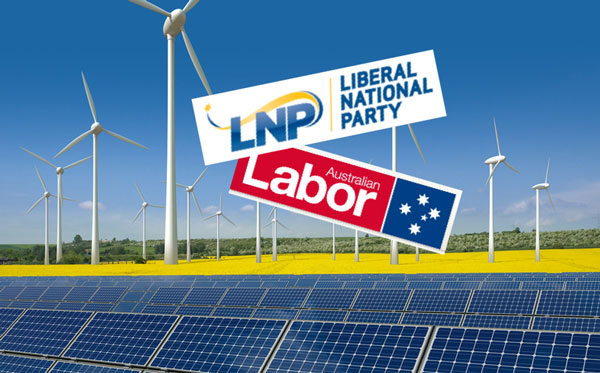At the end of a depressing week for renewables, talk over the SQHQ water cooler has been centred along the lines of: is it time to keep pollies out of solar power policy?
First we had the shrill and frankly rather desperate tactic of Kevin “The Queensland Kid” Rudd bucketing on the carbon tax introduced by his predecessor Julia “Who?” Gillard. The Kid seemed to aiming to appease the fossil fuel lobby (or was it Murdoch?) when he said his previous government had “got it wrong” on the carbon tax.
Not to be outdone the Coalition — in the form of the weighty “Sloppy” Joe Hockey — threw the switch completely to vaudeville. Perhaps trying to deflect attention from the awkward questions journos keep asking about costings, Sloppy announced that a number of renewable energy programs would not just be slashed but hung, drawn and quartered.
So much for solar power policy! Is this war on renewables?
Chief among these cuts is the gutting of funding for the Australian Renewable Energy Agency (ARENA) and the abolition of the Clean Energy Finance Corporation. Like most of the Coalition’s policies the details were sketchy and the logic even fuzzier with more details to be given “at a later date”. But you start to get the picture don’t you readers?
But back to the SQHQ water cooler discussion. Maybe its time for a change in thinking on solar power policy? Instead of pollies slashing funding for forward thinking renewable energy agencies like ARENA, how about we start slashing the pollies from where they do most damage: solar power policy? As recent Australian election cycles have shown, partisan politics are one of the main obstructions to a coherent solar power policy. Interestingly a study released last week based on recent economic modelling from the conservative energy agency the Australian Energy Market Operator (AEMO) claimed 100 percent renewable energy is possible by 2030 at little extra cost.
One of the key planks of the economic modelling is that market forces should be made to decide the price of renewables which would include a mix of solar, wind, geo thermal, hydro electric and biomass. However the unstated point would be that the public sector (run by the pollies of course) would only play a limited role. That is one of managing and supporting the renewable mix until it becomes self sustaining.
Certainty would be provided by the public sector up to a point to encourage long term investment in the future of renewable energy programs such as solar power. Policy would be to manage rather than destroy the renewable energy sector through uncertainty. A coherent and rewarding solar power policy in other words.
Market forces? Private sector? Reduced government? Even the Murdoch papers may back this. But would it work readers? Or would the pollies (state and federal) compromise this solar power policy by cutting renewable programs at the culmination of every election cycle? Your thoughts are of course welcome, both here or over at our discussion hub (and online water cooler), our Facebook Page.


 RSS - Posts
RSS - Posts



We’ll know nothing until _after_ the election. Policy decisions are being made literally between floors. What we do know is that, when a door opens (even momentarily, as with the Libs’ solar electricity scheme) you’d better move pretty quickly!~ 😀
I think the LNP policy will be revealed to show a more efficient way to increase the take up of renewables by getting rid of the huge cost of multiple government department overheads related to existing renewables policies, and using the funds available more effectively by direct funding and subsidisation ideas. This would not be detailed prior to the election, as it would represent some sort of a target for floundering ALP people. Those that have not quit already, or are about to be turfed out. The ALP spends vast amounts by creating a new administration for every thought bubble, leaving less funds for project development incentives. One example could be to subsidise feedback tariffs 1 for 1. Making network providers do the administration based on their amazing new capabilities brought about by forcing everyone to accept smart meters. I must run that by the ministerial advisers after the change of government, to see if I can get a hint on how else they might apply their incentive program.
” This would not be detailed prior to the election, as it would represent some sort of a target…”
Well, that’s the value of underpromising. Perhaps the savings on the scrapped (?) drones might be used. Alternately, once elected, employers may pressure the LNP to drop that ‘money-maker’, the maternity leave project and forego ‘the savings’. It’s true that alternative energy is part of the Liberal party’s DNA, so it would be astonishing if they didn’t target clean, renewable energy from the sun… . 😉